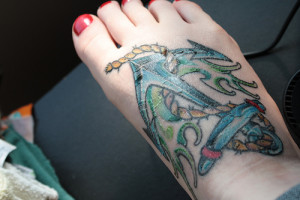How long do tattoos take to heal? That is a question few individuals ask prior to getting a tattoo. In reality, it should be the first question that is asked before you embark on such an adventure. Ordinarily, it will take between three to four weeks for a tattoo to heal, larger and deeper tattoos might take a slightly longer period to heal. Understanding how long does a tattoo take to heal is vital because it ensures that you avoid skin infections or the loss of skin color, issues that are a grim reality for many individuals.
How Long Do Tattoos Take To Heal – 10 Step Process
Choosing a reliable tattoo artist is only the first step towards having a tattoo you can be truly proud of. Understanding the tattoo healing process and knowing how long do tattoos take to heal is equally important. Even the best tattoo work can be ruined by poor aftercare. Find below the tattoo healing process explained in 10 Steps below.

Choosing a reliable tattoo artist is only the first step towards having a tattoo you can be truly proud of. Understanding the tattoo healing process and knowing how long do tattoos take to heal is equally important. Even the best tattoo work can be ruined by poor aftercare. Find below the tattoo healing process explained in 10 Steps below.
#1. At the point, a tattoo artist completes their job, the area of skin worked on is considered a ‘wound’. The artist will apply ointment around the area and apply a bandage. This is the beginning of the healing process.
#2. Experts are divided on the amount of time that a bandage should cover a tattoo with some advocating a period lasting a few hours upwards to three days. You are required to explicitly follow your artist’s recommendation and your job is to change the bandage to ensure that there is no buildup of bacteria.
#3. As healing progresses scabs begin forming around the edge of the tattoo, this is okay. Keep this area of the skin clean by running water through, do not use a washcloth to scrub the area as this might further irritate the skin plus the fact that the material may harbor bacteria.
#4. When drying the tattoo area ensure that you pat the skin using a soft clean towel. Desist from scrubbing the area for this will further irritate the skin.
#5. During the second week after getting a tattoo, there is a strong urge to scratch the skin. Deal with this irritation by applying moisturizers and antibacterial ointments. Dab just a bit of ointment because when too much ointment is applied, the tattoo might be suffocated and this might encourage an invasion of bacteria onto the wound.
#6. The ointment you apply should not be a petroleum based product. The reason is that oil will draw ink from the tattoo to the surface of the skin which may make a tattoo fade even before the color settles in.
#7. The ‘wound’ should be kept moist and applying an ointment that is not oil based, scented or colored. If all the above steps are followed religiously, the healing process should be half way done in two weeks.
#8. By the third week the scabs would have fallen and it should be dry.
#9. After this still there will be still a dead skin covering over your tattoo. The tattoo doesn’t look as bright as it was initially due to this covering.
#10. The dead skin also falls down and you get the real look of your tattoo. Your tattoo is completely healed now.
To ensure optimal healing of your tattoo, avoid the following:
- Soaking your tattoo in a bathtub or a swimming pool. The reasons are obvious, water draws out the ink from the tattoo plus there might be bacteria present in the water.
- Exposing the tattoo area to sunlight, UV rays can alter the colors of the tattoo and cause the skin to blister.
- Tight fitting clothes around the tattoo area, they irritate the skin surface and may precipitate an infection of the ‘wound’.
Overall, in a nutshell, with the above mentioned ten step guide on the tattoo healing process you can get an idea on how long do tattoos take to heal. Also, it will be a good that you be aware of the health risks involved during the process and be prepared to protect yourself from infections.





